This Savory Nutritionist-Approved Energy Bar Is Made With Meat
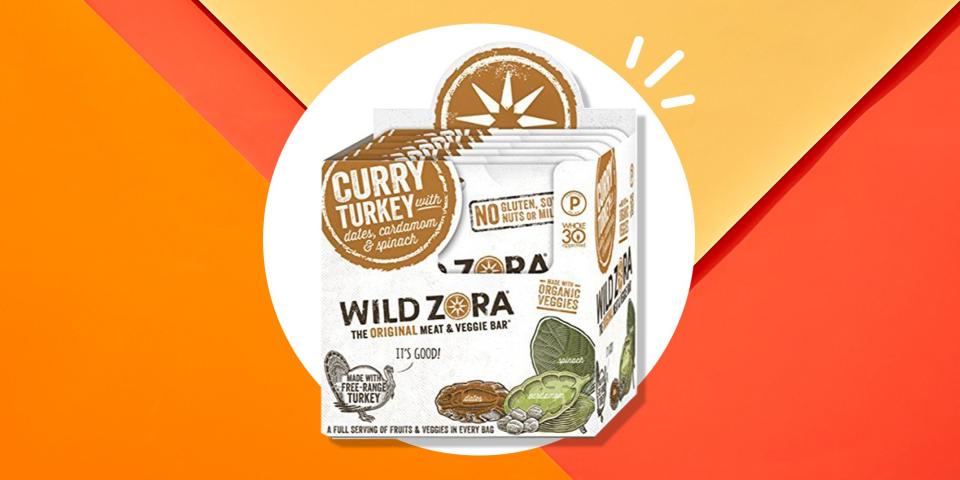
This Savory Nutritionist-Approved Energy Bar Is Made With Meat
Whether you're heading out for a hike or outdoor workout, or are an essential worker trying to make it through your shift, you're going to need some grab-and-go snacks to fuel your day.
Enter the energy bar. Note: They're not the same thing as a protein bar, explains Acacia Wright, RD, CD. Energy bars are designed for athletes to replenish calories they've burned, she says, and are typically higher in carbs. "Carbohydrates are absorbed faster than protein and fats, making them an ideal energy source for fueling endurance activities," Wright says. Protein bars usually have a lower carb count and pack more (you guessed it) protein.
Aja Gyimah, MHSc, RD, owner of Compete Nutrition, recommends reaching for an energy bar if you don't have a whole food snack handy, like berries or nuts. Choose energy bars made with nuts, oats, dried fruits, and whey protein isolate to keep you full. Protein crushes hunger, so look for a bar that contains at least 5 grams of protein for around 100 to 200 calories. Avoid hydrogenated oils (aka trans fats) and bars with more than 10 grams of added sugar—otherwise, you might as well be eating a candy bar. Make sure you check the caffeine content before you bite: "Many energy bars contain caffeine, and it’s important to know that before you grab an energy bar to eat with your morning coffee," adds Gyimah.
Here are the best energy bar brands that should be on your radar, and in your gym bag.
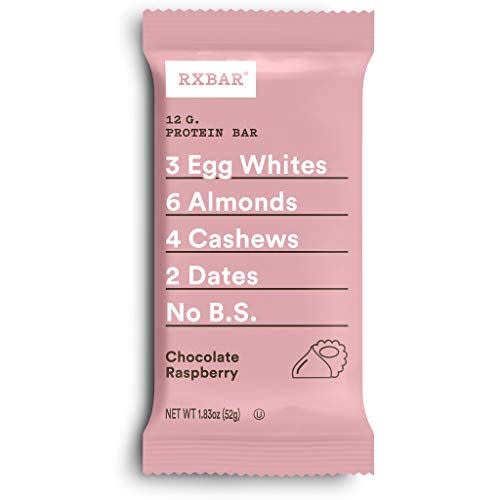
1) RXBAR Chocolate Raspberry Protein Bar
RXBAR
amazon.com
$23.77
All the ingredients in an RX Bar are listed right on its front wrapper, so you don't have to wonder what's in it (or worry about allergens, if you can't eat gluten, for example).
"Most contain five or fewer ingredients and have 'No B.S' aka 'No Bad Stuff'—referring to added sugars and fiber fillers—as part of their brand, which is why I love it," Gyimah says.
Per serving: 210 calories, 8 g fat (1.5 g sat), 23 g carbs, 16 g sugar, 170 mg sodium, 4 g fiber, 12 g protein
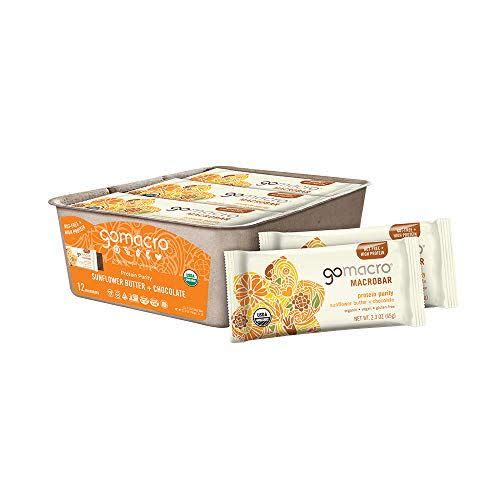
2) GoMacro MacroBar Sunflower Butter + Chocolate Organic Vegan Protein Bars
GoMacro
amazon.com
$24.00
For people with dietary restrictions, GoMacro is a great option. The bars are vegan, gluten-free and dairy-free.
"They even have low FODMAP snacks for those with digestive issues like IBS," Gyimah says. "Their bars are made from mainly whole ingredients that are sustainably and ethically sourced."
Per serving: 270 calories, 9 g fat (1 g sat), 38 g carbs, 11 g sugar, 25 mg sodium, 3 g fiber, 10 g protein
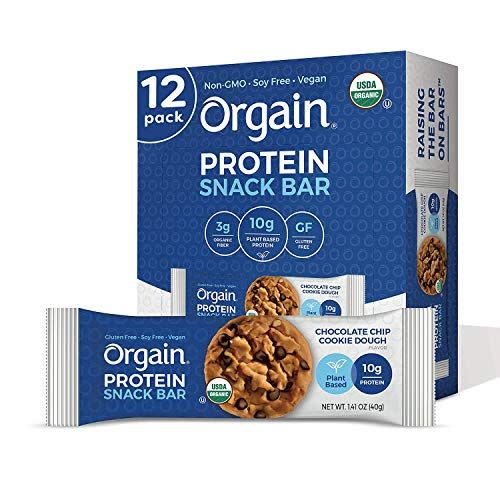
3) Orgain Organic Chocolate Chip Cookie Dough Protein Bar
Orgain
amazon.com
$17.88
With this plant-based protein bar, you can sneak in a filling snack between breakfast and lunch, lunch and dinner, or before a workout.
"These delicious Orgain bars are organic, vegan, non-GMO and made without gluten, soy and dairy ingredients," Wright says.
Per serving: 140 calories, 5 g fat (1.5 g sat), 20 g carbs, 5 g sugar, 125 mg sodium, 3 g fiber, 10 g protein
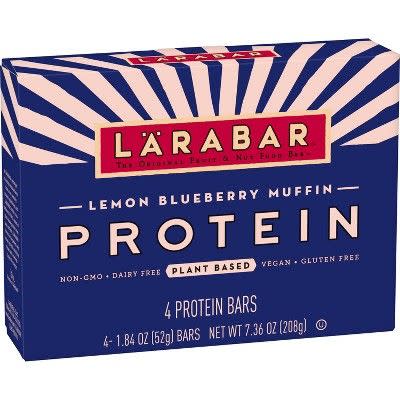
4) Larabar Protein Lemon Blueberry Bars
Larabar
target.com
$6.39
Don't be alarmed when you see 19 grams of sugar on the label. For this particular Larabar, the sugar comes from dates alone, and there's no added sugar.
"I love that they're vegan, dairy-free, gluten-free, and have 8 or less ingredients from mainly whole sources," Gyimah says.
Per serving: 220 calories, 8 g fat (0.5 g sat), 25 g carbs, 19 g sugar, 115 mg sodium, 4 g fiber, 11 g protein
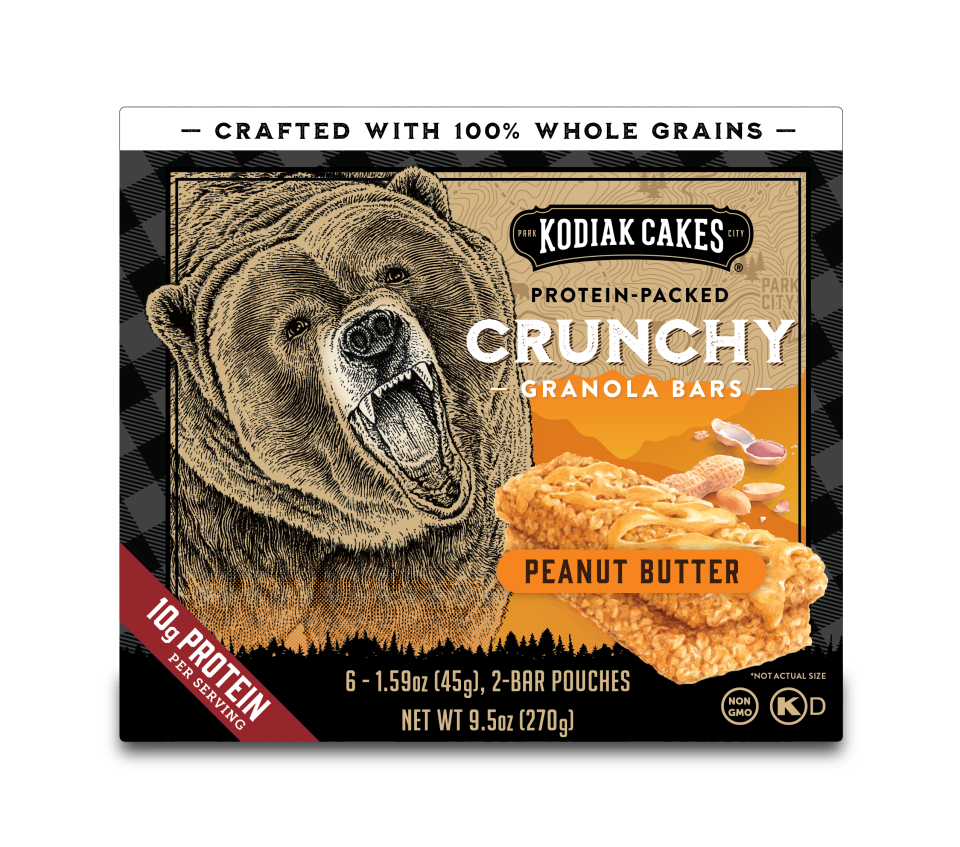
5) Kodiak Cakes Protein Packed Peanut Butter Crunchy Granola Bars
Kodiak Cakes
walmart.com
$4.47
These bars have a crunchy, granola-like texture, but are more like a protein bar in composition: They pack 10 grams of protein. They're made mostly with healthy, unsaturated fats, says Alayna Horvath, RD, CPT.
"The bars are made from a whole food of whole grain rolled oats, providing a nutritious source of carbohydrates in addition to being high in protein. It'll definitely keep you full and energized," Horvath says.
Per serving: 220 calories, 10 g fat (1 g sat), 23 g carbs, 11 g sugar, 170 mg sodium, 2 g fiber, 10 g protein
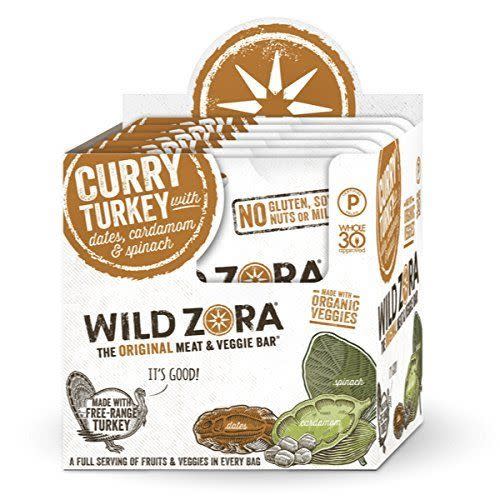
6) Wild Zora Curry Turkey Meat and Veggie Bars
Wild Zora
amazon.com
$29.90
Not all energy bars have to be sweet! "This savory bar features free-range turkey along with organic vegetables and fruits," Wright says.
More pluses: It’s also paleo-friendly, gluten-free, nut-free and soy free, Wright adds. It's low in carbs and in calories, too, but high in protein.
Per serving: 100 calories, 4 g fat (1 g sat), 10 g carbs, 7 g sugar, 210 mg sodium, 2 g fiber, 8 g protein
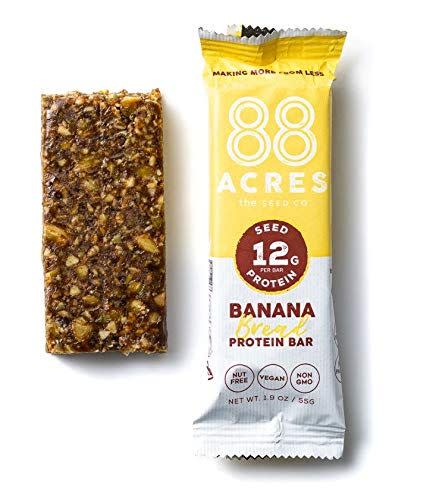
7) 88 Acres Banana Bread Protein Bar
88 Acres
amazon.com
$52.99
Because it's made with mostly organic pumpkin seeds (the first ingredient), 88 Acres bars are high in unsaturated fats, making it uber-filling, Horvath says.
It's also a healthier option because it only has 7 grams of sugar, only 4 of which are added sugars.
Per serving: 260 calories, 19 g fat (3.5 g sat), 15 g carbs, 7 g sugar, 140 mg sodium, 3 g fiber, 12 g protein
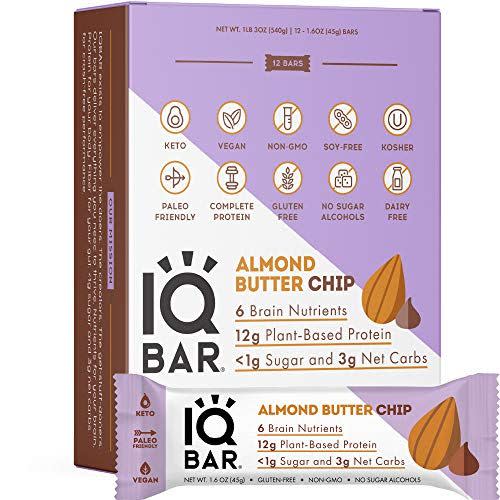
8) IQBAR Almond Butter Chip Brain + Body Protein Bars
IQ BAR
amazon.com
$24.99
This bar is packed with fiber and almost no sugar. It's also high in protein and unsaturated fat, all of which will help you make it from one meal to the next.
"When choosing a bar, a serving of at least 3g fiber is optimal," Horvath says. "Fiber also aids in keeping us feeling full and balancing our blood sugars," she adds.
Per serving: 150 calories, 12 g fat (2 g sat), 17 g carbs,

9) Primal Kitchen Almond Spice Protein Bars
Primal Kitchen
amazon.com
$35.40
Primal Kitchen bars are sweetened with monkfruit extract and are gluten-free, dairy-free, soy-free, and keto-friendly.
These are high in healthy fats, too, from almonds and flaxseeds. "Healthy fats are unsaturated fats, which typically come from foods such as olive oil, nuts, seeds, avocado, and fish. It is okay to include some saturated fats in your diet, but focusing on the unsaturated fats is the priority," Horvath says.
Per serving: 200 calories, 16 g fat (8 g sat), 9 g carbs, 2 g sugar, 115 mg sodium, 2 g fiber, 8 g protein
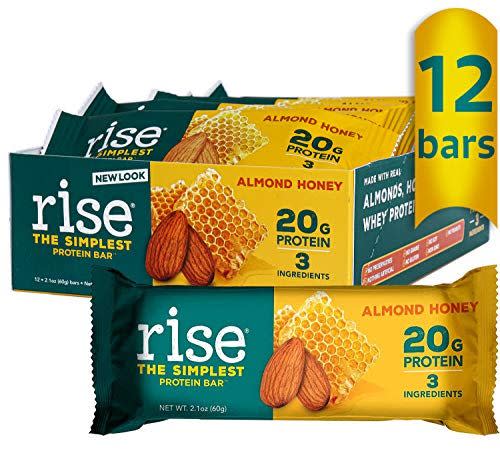
10) Rise Almond Honey Whey Protein Bars
Rise
amazon.com
$26.99
These bars are the real deal. "Made with only 3 ingredients (whey, almonds, and honey), this bar is as simple as it gets," Wright says.
It also has 20 gram of protein from whey protein isolate, and given its higher calorie profile, it can be enjoyed as a large snack or mini-meal, Wright adds.
Per serving: 280 calories, 20 g fat (1.5 g sat), 20 g carbs, 14 g sugar, 115 mg sodium, 4 g fiber, 20 g protein
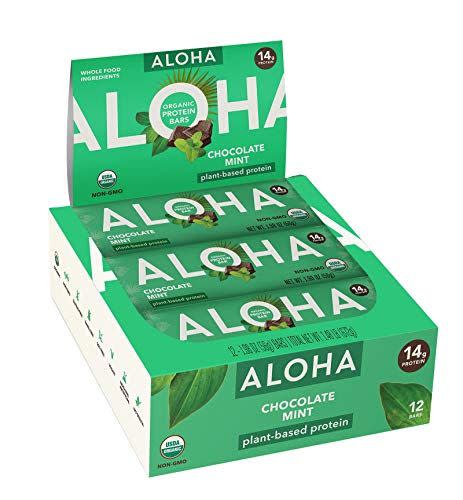
11) ALOHA Chocolate Mint Organic Plant Based Protein Bars
ALOHA
amazon.com
$29.99
Aloha Bars are naturally sweetened, without sugar alcohols, and have only 5 grams of added sugars. They're also high in fiber, and free from dairy, gluten, soy, and stevia.
"It is fairly common for energy bar companies to use sugar alcohols (xylitol, erythritol) and artificial sweeteners (sucralose, aspartame) to add sweetness to the bar without adding grams of sugar. Sugar alcohols and artificial sweeteners can have a negative impact on the bacteria in your gut, so it's best to avoid them," Horvath says.
Per serving: 220 calories, 9 g fat (1 g sat), 26 g carbs, 5 g sugar, 160 mg sodium, 12 g fiber, 14 g protein
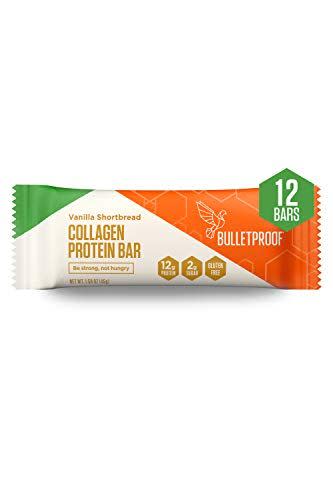
12) Bulletproof Vanilla Shortbread Collagen Protein Bars
Bulletproof
amazon.com
$34.95
The star of these Bulletproof bars is collagen protein, which can help nourish your hair, skin, nail, and bone health.
"Look for a protein content that has at least half the amount of the bar’s carbohydrates. For instance, if the bar contains 20g of carbohydrates, aim for at least 10g of protein," Wright says. These happen to be high in protein, with 12 grams, and have only 12 grams of carbs. The low-carb, high-fat nutrient profile also makes them keto-friendly.
Per serving: 220 calories, 14 g fat (6 g sat), 14 g carbs, 2 g sugar, 115 mg sodium, 5 g fiber, 12 g protein
Plus 11 other expert-approved picks.